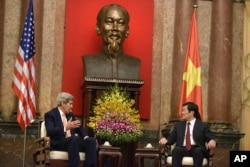U.S. Secretary of State John Kerry says the healing that has taken place between the U.S. and Vietnam took awhile and “didn’t come easy for either side.”
He commented in Hanoi Friday, in a speech marking the 20th anniversary of the normalization of diplomatic ties between the two countries.
At a civil society forum, he noted it took two decades to normalize ties.
“It took us 20 more years to move from healing to building. Think of what we can accomplish in the 20 years to come,” said Kerry.
Relations between the U.S. and Vietnam were severed four decades ago as the protracted Vietnam War came to an end.
In recent years, the United States and Vietnam have forged strong economic ties, with two-way trade topping $36 billion last year.
Vietnam’s Deputy Prime Minister Pham Binh Minh, who also spoke at the forum, said he believed relations between the two countries would be elevated to an even higher level.
Vietnam’s Human Rights Record Cited
In spite of strong trade relations, the U.S. has continued to raise concerns about Vietnam’s human rights record.
In June, the State Department released its annual human rights report. It cited Vietnam for problems including “severe restrictions on citizens’ political rights,” as well as police attacks and arbitrary arrests and detentions.
“Progress on human rights and the rule of law will provide the foundation for a deeper and more sustainable partnership between the United States and Vietnam,” said Kerry.
“The more we have in common, the easier it will be to convince our people to deepen our bonds and make sacrifices on each other’s behalf,” he added.
TPP
Both the U.S. and Vietnam are now part of negotiations for the Trans-Pacific Partnership (TPP), a massive 12-nation trade deal.
"Vietnam by far stands to benefit the most from the TPP," said Greg Poling, an Asia analyst at the Center for Strategic and International Studies.
He said the country will benefit not only because of its access to the U.S. market, but also because of accessibility to the Canadian and Japanese markets.
During his trip, Kerry is also meeting with Communist Party General Secretary Nguyen Phu Trong.
In July, President Barack Obama hosted Trong at the White House.
"There has been a bad, difficult chapter our history," said Trong during a joint appearance with Obama. "But we have been able to rise above the past to overcome differences, to promote our shared interests and look towards the future," he added.
South China Sea
In addition to trade, maritime security issues in the South China Sea have become a major focus of U.S.-Vietnamese ties. During his last visit to Hanoi in 2013, Kerry announced the U.S. would provide Vietnam with five fast patrol ships to improve its Coast Guard.
Kerry's trip to Vietnam is the last leg of a five-nation visit to the Middle East and South Asia.
He arrived in Hanoi from Kuala Lumpur, Malaysia, where he attended the ASEAN (Association of Southeast Asian Nations) regional forum.
Maritime security was among the issues raised by foreign ministers attending the forum, particularly China's controversial construction of islands in waters where its neighbors have overlapping claims.
Kerry said it is "essential" to maintain freedom of navigation and overflight in the region.
"Despite assurances that these freedoms will be respected, we have seen warnings issued and restrictions attempted in recent months," said Kerry.
He urged the countries to commit to stop the construction and militarization of features in the region to lower tensions.
Iran Nuclear Deal Welcomed
ASEAN foreign ministers also agreed to back the Iran nuclear deal, known as the Joint Comprehensive Plan of Action (JCPOA).
In a statement Thursday, ministers said if the deal is fully implemented, it will "contribute to building confidence in the exclusively peaceful nature of Iran's nuclear program."
VOA's Pam Dockins in Hanoi:







